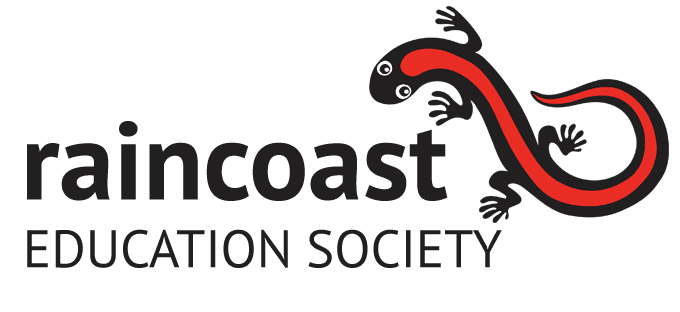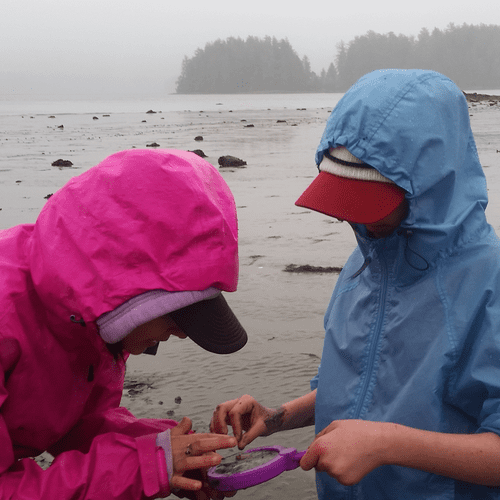Raincoast Field School: Background and History
In the spring of 2014 the BCTF and the BC government were embroiled in a significant labor dispute. The BC government locked out BC teachers and as a result, the BCTF underwent job-action and began a full time strike. Recognizing an immediate need in the community for education, and seizing the opportunity to provide educational services to local students, the Raincoast reacted swiftly and created an impromptu Field School. With daily drop off sites listed online, a $40 daily registration fee (that was reimbursable through a BC government child care allowance) and exciting and unique outdoor education programs that ranged from Big Tree Trail hikes, beach seines, wild food harvesting, bear watching and animal tracking, intertidal explorations among many other programs, a model for a successful Field School emerged. Parents of participating students were raving about what we were doing, students were excited and engaged (even skipping family camping trips to participate in our school!) and we had widespread support in the community.
The Field School model had proven successful and the goal was to expand it to become incorporated within the school (Wickaninnish Community School) so that what we were providing was available to ALL of our community’s students. After successfully proposing a Field School to the staff and administration at WES (who agreed to commit two full days programming for each class in the spring of 2015), the next step was to fundraise and call on our community relationships to make our vision a reality.
Through the strong reputation of the RES and the personal relationships established through staff (Dan Harrison, Luke Stime and Brady Clarke) we were able to secure huge discounts from local companies for services (boat rides, eco tours, surf and paddleboard lessons, etc.). Without these significant discounts, much of what we provided would not have been possible. It is imperative to maintain and build upon these relationships, and to continue treat our partners with the utmost respect and gratitude in order to continue us to support our community’s youth. Whenever possible and appropriate we were sure to acknowledge and recommend these businesses for their support.
Fundraising efforts were multifaceted, but the primary focus was on receiving financial support from the Wickaninnish Parents Advisory Council. During a PAC meeting a successful bid for support was made and they agreed unanimously to meet our proposed budget of ~$6000 annually. They hosted a community event The Wickaninnish Fun Fair (an annual fundraiser hosted at WCS) and raised enough to fully support the first Field School and to contribute funds to the 2015/16 Field School.
Additionally the RES created and hosted a photography event Capturing the Coast (see appendix) that raised an additional ~$2000 and brought widespread attention to our Field School.
Finally, with a longstanding goal of the Education Coordinator to incorporate Rediscovery programming for our 50% aboriginal student population, it was decided that this would be the perfect opportunity. The RES contracted Gisele Maritn (Tla-o-qui-aht Cultural Educator) and outlined our goals and our schedule.
With funding secured, businesses on board and school staff and administration committed, and Gisele as a key component of our team, scheduling and planning programs for each class began. It was decided (due to weather, local tourism business availability and school scheduling commitments that a end of April-June (8 week ) schedule would work best. Teachers were given the available dates and back-to-back days (Tuesdays and Wednesdays) were decided upon for ease of scheduling and to build upon lessons.
In planning programs the focus was first and foremost to get students outside on the land and water, experiencing the natural and cultural history of this place firsthand. More specifically, we tried to have an ecology/natural history day and a cultural, traditional knowledge day. A letter was issued to each teacher (see Contents Section 5, II), asking for input on areas of study or specific activity requests and then the BC curriculum packages (https://www.bced.gov.bc.ca/irp/) were consulted for each grade (specifically the Science and Social Studies sections) and appropriate learning outcomes were selected as an area of focus. The goal was an overarching theme for each week, with programs, activities and sites feeding into the overall theme. (see Contents Section 2).
The 2015 Spring Field School exceeded all expectations and was extremely well received by the students, teachers, administrators, parents and the community at large. With the success of the inaugural Field School, moving forward the goal is to extend the Field School to incorporate an additional fall session, or perhaps weekly regularly scheduled days (dependent upon school staff and administration support), and bring the Field School into other schools in the region.



